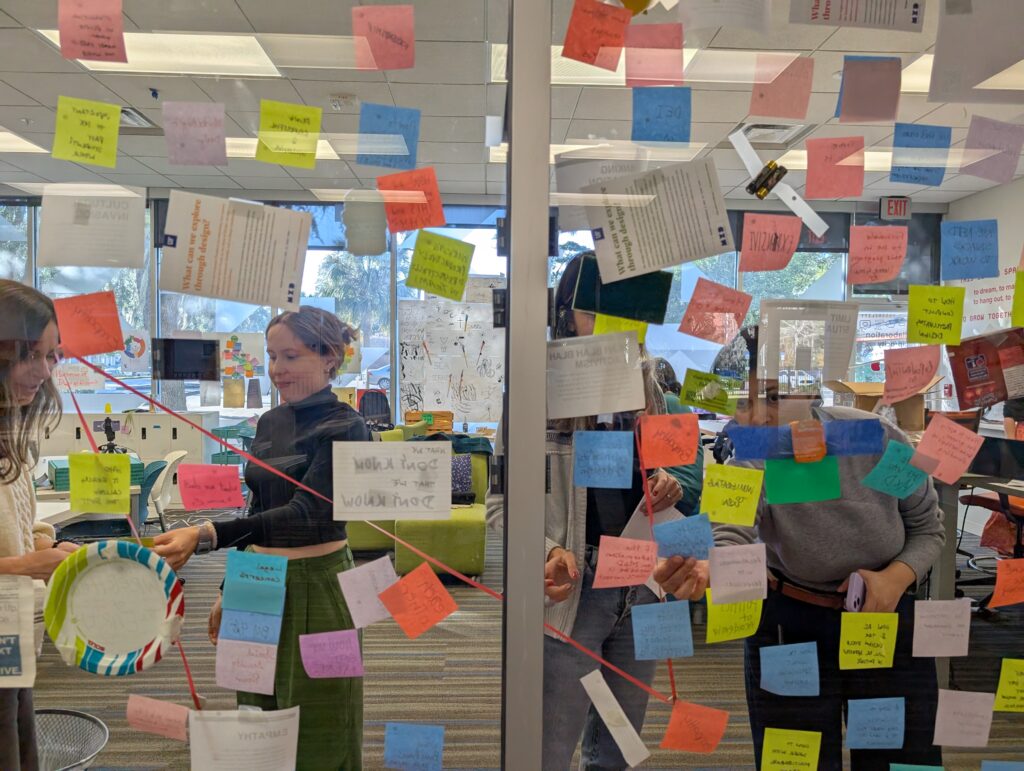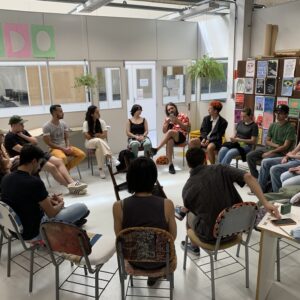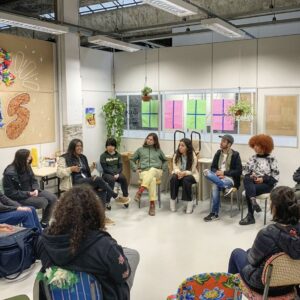Research and Practice is a 45-hour course at the University of Florida that immerses Design and Visual Communications (MXD) graduate students in the practice of doing design research.
The Spring 2025 cohort experienced a full-blown self-managed studio, meaning students managed their studio learning experience with instructor guidance. The instructor played the facilitator and, eventually, the complicator role. Instructor assisted students in gathering, envisioning possibilities, problematizing the taken-for-granted, making decisions, and executing their plans together. Students were encouraged to take the lead in defining what to learn and what to design, following a participatory governance model.
As a proposal to organize the production of knowledge, the instructor suggested using the Rumsfeld/Zizek Matrix, a shared knowledge visualization technique. The matrix is laid on a board where post-it notes summarizing specific knowledge can be attached. Using this matrix, students identified generative themes at the end’s of Fall 2024 Research and Practice’s class. These themes will be approached in the first weeks and the remaining ones will be designed with student participation following the self-managed studio approach.

The board will be updated every class as a moment of reflection on what has been collectively achieved. After updating the board, a negotiation on what to do next will follow. Students can learn and design anything that suits the studio’s historical trajectory.
Assignments
There were two assignments for this class: the mid-term and the end-term reflection text. The midterm reflection serves as a critical analysis of the researchers’ progress in learning and designing during the initial phase of the course. It involves documenting the knowledge gained, uncovering hidden or overlooked skills, and reflecting on the designs created as a way to produce new knowledge.
The reflection addresses four primary areas: the categorization of knowledge using the Rumsfeld/Zizek Matrix, strategies developed to enhance the learning process, the impact of created designs in generating knowledge, and evolving perspectives on the design process. Insights from course activities, readings, and experiments form the basis of the reflection.
The end-term reflection provides a comprehensive evaluation of the researchers’ learning and designing journey throughout the course. It examines the evolution of their understanding of design research, focusing on key moments, strategies, and outcomes that defined their experience. The reflection emphasizes the relationship between created designs and the production of new knowledge, while contrasting this approach with traditional design practices. Key areas of focus include the progress made since the midterm, significant learning moments that shaped the journey, the refinement of metacognitive and design skills, and the contribution of designs to knowledge production. Additionally, the reflection considers how these insights can inform future research or projects.
Semester outline
Week 1 – Self-management in design education
Lecture: The Self-Managed Studio https://fredvanamstel.com/talks/the-self-managed-studio
Suggested reading:
Bizotto dos Santos, W.B., Mazzarotto, M.,and Van Amstel, F.(2023) Learning design as a human right: the beginnings of a design lab founded on critical pedagogy, in Derek Jones, Naz Borekci, Violeta Clemente, James Corazzo, Nicole Lotz, Liv Merete Nielsen, Lesley-Ann Noel (eds.), The 7th International Conference for Design Education Researchers, 29 November – 1 December 2023, London, United Kingdom. https://doi.org/10.21606/drslxd.2023.104
Bonus link: https://pt.crimethinc.com/posters/capitalism-is-a-pyramid-scheme
Week 2 – Self-management in social movements
Lecture: Designing as a user https://fredvanamstel.com/talks/designing-as-a-user
Suggested reading:
Gonzatto, R.F., van Amstel, F.,and Jatobá, P.H. (2021) Redesigning money as a tool for self-management in cultural production, in Leitão, R.M., Men, I., Noel, L-A., Lima, J., Meninato, T. (eds.), Pivot 2021: Dismantling/Reassembling, 22-23 July, Toronto, Canada. https://doi.org/10.21606/pluriversal.2021.0003
de Siqueira, I. L. M., & van Amstel, F. M. (2023). Service design as a practice of freedom in collaborative cultural producers. In Proceedings of the Service Design and Innovation Conference (ServDes 2023), Rio de Janeiro. pp. 315-325. https://doi.org/10.3384/ecp203016
Bonus links:
https://fredvanamstel.com/portfolio/corais-ecosystem
Week 3 – Self-management in entrepreneurship
Lecture by MFA student Narayan Ghiotti
Movie: Lord of the Flies (1963)
Suggested reading:
Brendel, W., Hankerson, S., Byun, S., & Cunningham, B. (2016). Cultivating leadership Dharma: Measuring the impact of regular mindfulness practice on creativity, resilience, tolerance for ambiguity, anxiety and stress. Journal of Management Development, 35(8), 1056-1078. https://doi.org/10.1108/JMD-09-2015-0127
Week 4 – Self-management in public life
Lecture: Knowledge self-management in design research https://fredvanamstel.com/talks/knowledge-self-management-in-design-research
Movie: The Pervert’s Guide To Ideology (2012)
Videos:
Donald Rumsfeld Unknown Unknowns ! https://www.youtube.com/watch?v=GiPe1OiKQuk
Slavoj Žižek – ‘Los conocimientos desconocidos’ https://www.youtube.com/watch?v=e8diRggDUic
Philosopher Slavoj Žižek on the re-election of Donald Trump & his fears for Western values https://www.youtube.com/watch?v=o8m13m1PS6M&t=573s
Suggested reading:
Žižek, S. Philosophy, the “unknown knowns,” and the public use of reason. Topoi 25, 137–142 (2006). https://doi.org/10.1007/s11245-006-0021-2
Week 5 – Self-management in culture circles
Movies:
Peru: Literacy for Social Change (1978) https://www.youtube.com/watch?v=mSgBkbJbzRs
Absolute Majority (1964) https://www.youtube.com/watch?v=Egzl9AW4dFo
Suggested readings:
Souto-Manning, M. (2010). Chapter Culture Circles and Critical Pedagogy In: Freire, teaching, and learning: Culture circles across contexts (Vol. 350). Peter Lang.
Fonseca Braga, M., M. C. van Amstel, F., and Perez, D. (2024) Social Design at the Brink: Hopes and Fears., in Gray, C., Hekkert, P ., Forlano, L., Ciuccarelli, P . (eds.),DRS2024: Boston, 23–28 June, Boston, USA. https://doi.org/10.21606/drs.2024.1538
Week 6 – Critical analysis of media representations
Movie: bell hooks On Cultural Criticism (1997) https://www.youtube.com/watch?v=u3hY6p6kyAM
Suggested readings:
Madison, Roberts (student). Who Gets the Spotlight? Unpublished draft.
Mannion, K. A. (2016). Play like a girl: An analysis of media representation of female athletes. Proceedings of GREAT Day, 2015(1), 17. https://knightscholar.geneseo.edu/proceedings-of-great-day/vol2015/iss1/17/
Week 7 – Encoding and decoding representations of diversity
Movie: Stuart Hall: Representation & the Media (1997) https://www.youtube.com/watch?v=84depWskwu0
Videos:
Everything is Awesome Lego Movie song https://www.youtube.com/watch?v=9cQgQIMlwWw
LEGO Designer Interview | LEGO Everyone is Awesome (Matthew Ashton) https://www.youtube.com/watch?v=mC6H15Z8d6w
Suggested readings:
Hall, S. (1973). Encoding and Decoding in the Television Discourse. Paper for the Council of Europe Colloquy on “Training in the Critical Reading of Televisual Language” (CCCS Stencilled Paper 7), Organized by the Council and the Centre for Mass Communication Research, University of Leicester. Centre for Contemporary Cultural Studies, University of Birmingham. http://epapers.bham.ac.uk/2962/
Hall, S. (1981). Encoding/Decodings. In: Culture, Media, Language, Routledge, London.
Week 8 – Self-evaluation in design education
Movie: Symbiopsychotaxiplasm: Take one (1968) https://www.youtube.com/watch?v=gN1tjjJyazA
Suggested readings:
Coorey, J. (2012) Reflective Methods in Design Pedagogy, in Israsena, P., Tangsantikul, J. and Durling, D. (eds.), Research: Uncertainty Contradiction Value – DRS International Conference 2012, 1-4 July, Bangkok, Thailand. https://dl.designresearchsociety.org/drs-conference-papers/drs2012/researchpapers/27
Week 9 – Interaction analysis lab of week 5’s culture circle
Task: For this class, students select a 1-2 minutes video segment from the culture circle recordings found in the Dropbox folders bellow. There is no need to edit the video file, just bring the timestamp or an edited excel transcript. The segment must show the student in action as we will self-reflect about that student’s presence in the culture circle.
Suggested readings:
Freire, P. (1974). Chapter Education and Conscientização and Appendix I. In: Education for Critical Consciousness. Continuum.
Boal, A. (1995). Chapter 1. The rainbow of desire: The Boal method of theatre and therapy. Routledge.
Week 10 – Spring break
Week 11 – Self-management in Government
Suggested reading:
Blomkamp, E. (2018). The promise of co-design for public policy 1. In Routledge handbook of policy design (pp. 59-73). Routledge.
Week 11 – Self-management in the Arts
Suggested readings:
Santos, Barbara. The Art of the Kuringa (English). http://kuringa-barbarasantos.blogspot.com/2010/08/art-of-kuringa.html
Phan, Hien; Van Amstel, F. M. C. (under review). Mapping migration paths.
Week 13 – Forum Theater experiment
Suggested reading:
Van Amstel, F. M. C., & Secomandi, F. (upcoming). Collective embodiment in service interfaces. In D. Sangiorgi, L. Penin, & A. Prendiville (Eds), Handbook of Service Design:
Plural perspectives and a critical contemporary agenda. Bloomsbury.
Bonus links:
Forum Theater https://fredvanamstel.com/tools/remote-forum-theater
Week 14 – Design Theater experiment
Lecture by Cassie Urbenz (student): Privatization of Public Higher Education and Graduate Labor
Suggested reading:
Van Amstel, Frederick M. C., Serpa, Bibibiana, Secomandi, Fernando. (2025). Systemic oppression in service design. In: Suoheimo, M., Jones, P., Lee, S., Sevaldson, B (Eds). Systemic service design. Routledge. http://dx.doi.org/10.4324/9781003501039-7
Bonus links:
https://fredvanamstel.com/portfolio/design-and-precarious-work-in-digital-platforms-2021
Week 15 – Speculative Object Theater experiment
Videos:
To have or not to have https://tamtamtheater.nl/en/voorstellingen/to-have-or-not-to-have-en/
Suggested reading:
Van Amstel, Frederick M. C. and Gonzatto, Rodrigo Freese. (2022). Existential time and historicity in interaction design. Human-Computer Interaction, 37(1), pp.29-68. DOI: https://doi.org/10.1080/07370024.2021.1912607

